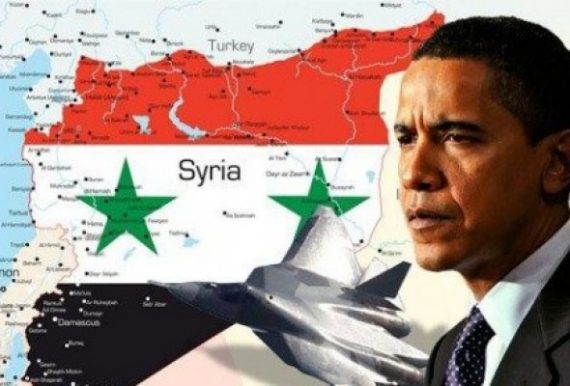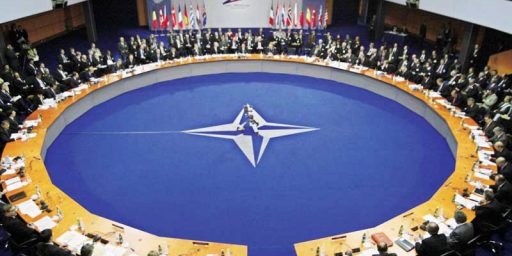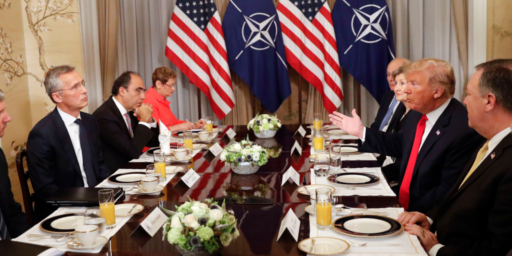Obama’s Confused Syria Strategy
Humanitarian wars have their own grammar but not their own logic.
My latest for The Atlantic and first outside publication since starting at Marine Command and Staff, “Why Obama’s Plan to Strike Syria Makes No Strategic Sense,” has posted. I’m testing the limits of academic freedom at a military institution early.
My argument is lengthy and somewhat complicated, citing many expert sources. It was inspired by this pithy declaration from Handelsblatt that Dave Schuler cited yesterday:
Humanitarian wars are also wars. Those who jump into them for moral reasons should also want to win them. Cruise missiles fired from destroyers can send a message and demonstrate conviction, but they cannot decide the outcome of a war. Neither can a “we’ll see” bombardment. There has to be a strategic motivation behind the moral one, and it demands perseverance.
As I put it,
To paraphrase military theorist Carl von Clausewitz, humanitarian wars have their own grammar but not their own logic. That is, they’re fought to achieve political objectives and judged on whether they have been achieved. Regardless of what modifier accompanies it, wars are fought, in the words of the British military theorist Basil Liddell Hart, to “obtain a better state of the peace.”
The problem is that the administration has repeatedly declared that “Assad must go” and yet pleads that regime change is not the goal of whatever operation may or may not be forthcoming.
Carney declared “there must be a response” to the chemical attacks and other “administration officials” have said that the strikes would “send a message.” Any message sent by launching military strikes explicitly not designed to achieve one’s stated strategic goal would be cryptic, and should probably be accompanied by a decoder ring.
One bit that I liked that wound up on the editing room floor:
In explaining why we have stood by as the death toll mounted in Syria after intervening militarily in the face of much smaller in Libya, both the Obama administration and NATO have repeatedly pointed to the backing of the international community for the latter in the form of Resolutions 1970 and 1973. Of course, the Security Council has consistently refused to authorize action in Syria. And, while some of our most powerful European allies may participate in this current effort, NATO has once again made it clear that it will be sitting this one out. So, the Obama administration would be enforcing one international norm while violating another and bolstering his credibility vis-a-vis red lines while undermining it vis-a-vis unilateral action.
There’s a whole lot more at the link. I urge you to read the piece and then join the discussion here, there, or both.







Actually, this may be an excellent place to leverage your new position. Probably the single most important thing a staff officer can do is tell the boss when he’s got a bad idea. If the President & SECDEF can’t articulate what they want to accomplish with a military strike in Syria, what the target will be, or what they want the area to look like afterwards, then the Chairman and the JCS need to tell them “then we aren’t pulling that trigger, sir”. You need look no farther back than the deliberate failure to create a post-invasion plan during OIF for examples of exactly what this lack of goals can lead to…
Actually, James, it makes perfect sense if American strategy is to keep the war going. Chemical weapons might be the straw that broke the rebel back, and forcing Assad to take them off the table, equalizing the conflict, would make perfect sense. If the object was to keep the war going.
Why would we want to see the continuation of a war that pits Assad/Iran/Shia/Hezbollah/Russia against Rebels/Al Qaeda/Saudi Salafists? Come on, the question answers itself.
With no good option possible, why would we not favor the option that amounted to Hezbollah and Al Qaeda bogged down in an long-running war?
You can say it’s too ruthless, but given that there is no happy outcome possible, isn’t this the best option available?
@legion: One of my enduring takeaways from ROTC, now 25 years in the rearview mirror, is Major Sid Kooyman’s admonition that “An officer’s job is to selectively disobey orders.”
@michael reynolds: It’s a possibility that Edward Luttwak outlined in WSJ a few days back. It’s realpolitik in its extreme and not without its strategic dangers–to say nothing of the humanitarian ones.
It’s realpolitik but not realistic unless Obama can conceal his hand – his own constituency would be repelled.
But I keep going back to: what’s the better outcome? If you’re POTUS and you’ve sat in the situation room listening to your intelligence chiefs and your advisors and your generals, and what you keep hearing is that either an Assad win or a rebel win is likely to be followed by massive purges, slaughters, ethnic/sectarian cleansing and either an empowered Hezbollah or Al Qaeda, don’t you at some point begin to think, “Well, to hell with it, let’s just let them keep killing each other”?
And once you’ve reached that conclusion don’t you respond to a possible game-changer like chemical weapons?
Perhaps if we argue in a vacuum about the sagacity of a cruise missle strike, one could make the case to hit Syria, but this straightforward decision is completely obfuscated by the fact that we are mired in two concurrent wars in that region which militates against any action.
In the absense of the past decade of mistakes and miscaluculation regarding that region, hitting Syria if we weren’t already involved in Iraq and Afghanistan might be a good message to send, but put in the gestault of our exposure and current political interests, hitting Syria is pure folly and stupidity.
Obama rushing in is no different than the “without a doubt” Cheney clusterphuck.
I don’t see any good options here and am decidedly against any intervention I have seen proposed to date. That said, why does there have to be some overarching goal beyond making the use of chemical weapons come with consequences painful enough to render their use counterproductive? Do we really think that he can or will strike back at us in any meaningful way absent us having boots on the ground there?
The first rule of strategy is never choose a plan that requires your adversary’s cooperation to succeed.
In that light, suppose Syria’s response to Obama’s “limited military option” is an even bigger chemical attack on civilians? Then what?
It’s a great article about war, but maybe this is just about slowing the proliferation of CW.
I’m on the fence about American intervention in the Syrian civil war, but I feel strongly that those who are against intervention should admit, if only to themselves, that in their opinion Assad’s use of chemical weapons to massacre his own people is preferable to American involvement. I’m putting it this way because I remember the pathetic response of the foreign policy realists and of the antiwar movement to the genocide in Cambodia after the Khmer Rouge victory. It was a rare moment in American political life — Henry Kissinger and Noam Chomsky in complete agreement about American foreign policy. If we’re going to stand aside, as desired by James Joyner and his supporters in this thread, let’s at least understand the consequences.
@dazedandconfused:
That horse is kind of out of the barn. Every country that wants them has them. Or at least had them until they destroyed them after signing on to the convention banning them.
Dave Schuler raised and excellent question the other day, paraphrased, “What if evidence emerges that the rebels did it?” It appears to me Obama has irrevocably placed himself, and the US, in a position of not being able to support them
Those who are pressing Obama to intervene against Assad in this conflict, and some of them have considerable political “suck” in domestic US politics, would be checkmated.
@Dave Schuler:
I suggest it may be a matter of scale.
@Stan:
The only outcome that would ensure that Assad never used chemical weapons on his own people again is regime change. The only strategy that would ensure regime change is invasion–boots on the ground.
Are you arguing that we should invade Syria?
You’re presenting it as a binary choice but it isn’t one. You can oppose Assad’s using chemical weapons on his own people and be opposed to our invading Syria at the same time. I don’t know how one would go about justifying killing a bunch of people to have no effect.
I’ve been reading the posts here the last several days taking in opinions of people more informed than myself, but I have to agree with this statement. Preventing the use of chemical weapons in any capacity seems like a valid strategic objective. Not saying that a strike will accomplish it, but by not responding the international community, not just the US, is saying “sure go ahead and use those internally when you are desperate, it is worthwhile to stockpile them and maintain them.” That seems like a nice lead to more proliferation rather than less.
@Dave Schuler: You may be right in arguing that only a land invasion would end the massacre. That’s why I’m undecided about what we should do. But I think we should admit the consequences of our actions and our lack of actions. In your view the effects of Assad’s use of chemical weapons, including their legitimization for use in future civil wars, is less harmful than American intervention in another war in the mideast. I envy you your certitude, but I can’t share it.
@Dave- We got Kadafi to stop killing US citizens w/o regime change. If you assume Assad is rational, wouldnt he have to weight the costs of using chemical weapons vs the benefits? He has plenty of other ways to kill people.
Steve
One thing Obama must do before things heat up much more is to freeze the price of gas: csn’t go up over $3.50 a gallon (and that is way too much). We’re not going to pay no $5 a gallon because of some mess in the middle east.
Since England is staying out for now, may we could borrow General Allenby and Colonel Lawrence.
@steve:
You are comparing apples and oranges.
Dave S. is completely right. The only way this threat works is if we are willing to escalate if there is no compliance.
@Stan:
This is correct. Which means we need to take a hard look at our history of intervention in the middle east and ask the following question — Have we ever made things better there through direct/indirect military intervention? And how often have we made things worse?
Given those odds, which tend to be pretty heavily stacked in favor of “we made things worse”, what leads you to believe that we have a serious chance here of making things better?
This talk of Obama ‘s strategy as being confused is wrong. Obama’s goal isn’t “confused” simply because its not James Joyner’s preferred goal.
Obama’s stated immediate goal is to punish Assad for engaging in a large scale chemical attack on his own people-an attack that killed 1429, including over 400 children. The long term goal is that this punishment will deter Assad from further attacks. Obama reasons (correctly IMO) that in the absence of further action, Assad will move on to larger and deadlier chemical attacks. What is so confused about that?
What seems unrealistic IMO, is the view by non-interventionists that Assad WON”T escalate the pace and severity of his chemical attacks and that this won’t tip the balance further in this favor. It also seems unrealistic to think that other military leaders in the ME and elsewhere wouldn’t take note of this and begin amassing and using their own chemical arsenals. I imagine its a lot and cheaper to acquire and amass such an arsenal than it is to build a nuclear bomb. Once the genie is out of the bottle, it will be out-all over the world.
@Stan: Is it your position that it’s permissible for rulers to murder 99,000 of their own people, so long as they don’t use chemical weapons? That would seem to be the implicit message.
@Matt Bernius: If we can destroy Assad’s ability to wage chemical warfare on his own country we’ve made things better for the Syrian people. If we manage to establish the principle that chemical warfare is out of bounds, like nuclear and biological warfare, we’ve made things better for the world. These are limited goals, but they’re worthwhile.
@michael reynolds: Michael, this give rather short shrift to those Syrians — liberal, not particularly religious, pro-democracy — who are also fighting the Syrian regime. They are uneasy bed partners with religious extremist groups that share the goal of getting rid of Assad, but they part company — with attendant bloodshed — once the regime is gone.
How to give aid and assistance preferentially is the part the that US administration is struggling over. Creating a situation where the regime cannot win by slaughtering tens of thousands is not a winning strategy, if that means coming out with a fully organized plan for ‘what comes next’. But it’s a way of excluding at least one possible outcome.
I suppose the US could decide to just open its doors to all Syrians (and Lebanese, because they’re next) who don’t want to live in Syria anymore, filtering for the extremists. But I don’t see or hear any rush for this ‘solution’ either.
The US could undertake a ‘punitive action’ that would hurt the Ba’athis regime, but any action comes with attendant risks. The Russians have told their citizens to leave Syria. Let them leave, then take out the port of Tartous, or at least damage it seriously enough that it’s not functional for some time. Do try and avoid any Russian ships that happen to be in port.
Alternatively, just stopping most of the road and rail traffic that enters Syria from Iraq would send the signal without quite the same risk.
The US could also take out most runways in the country, air force hangers, military HQs. Maybe focusing on Syrian air defense systems, even if it were to take a thousand or two cruise missiles, would send a message to the Syrian gov’t’s pocketbook. Taking out 100% would not be necessary to make the point.
This is a tough problem, no question about it. While there’s a bad guy on one side, the other side is made up of a combination of good and bad guys — they aren’t all foaming Salafis and Al-Qaeda. Channeling assistance to only the good guys is hard to do, especially from and ocean and a sea away. Coordinating assistance with Turkey, Jordan, and Saudi Arabia — which is not supporting the Salfis and is jailing Saudis for encouraging jihad — might be the only way to do that.
Guaranteed success? Of course not. If there are better options, though, there are a lot of ears waiting to hear them.
I think sitting it out is sub-optimal. Maybe if there were no TV or Internet, no images of dead children lying in rows this could be done. But not reacting in some way has its price too. It could certainly signal that CW is okay because nobody’s willing to do anything about it. Maybe not — but no guarantees there, either. What standing by certainly would not do is prevent other villages and towns from being gassed if the regime thought it had to do it to survive.
They Syrian regime is not the kind that really cares when it’s on the receiving end of a global Tsk-Tsk!!
@James Joyner: No, it isn’t. I’m groping for a way of accomplishing a very limited goal — ending the use of chemical warfare in Syria and establishing a precedent for future wars — in a way that involves as little loss of life as possible. Pursuing regime change in Syria is beyond our capabilities, and probably would wind up as a humanitarian catastrophe, like Iraq and Afghanistan. I don’t view an attack of the type the president is talking about in the same category. And if you don’t mind me saying so, I think you’ve lost faith in the ability of the US government to act in a rational way and that your disillusionment is warping your judgement.
@James Joyner:
That last statement seems to be rather disingenuous since your argument seems to be it is permissible for rulers to murder 99,000 of their own people anyway they want if the US has no direct interest.
@Stan: Aside from making some ill-advised pronouncements, I think President Obama has indeed acted rationally up until this point vis-a-vis Syria. And I think he’s acting rationally in trying to minimize this particular action. What I think irrational is:
1. Prioritizing ~1000 killed by chemical weapons over 100,000+ killed by other weapons
2. Having regime change as your constantly-announced goal but explicitly renouncing it WRT this mission.
3. The notion that pinprick strikes not aimed at regime targets will impact future chemical weapons use.
@c.red: I think the US has a direct, important (less than vital but more than peripheral) interest in stopping the slaughter of innocents. I just don’t think we have non-awful options in this case.
I can certainly agree on that point.
Wars cost money. Detroit is bankrupt, along with other American cities. Who’s going to pay for Obama’s lust for war with Syria?
Obama lies period, and he is a madman. Everything Obama does is not good for America. There’s no confusion because he deliberately destroys. Destruction is his intent and purpose and he wants America to get militarily involved in Syria because he knows what the Russians and the Chinese are going to do to us.
“The thief cometh not, but for to steal, and to kill, and to destroy: I am come that they might have life, and that they might have it more abundantly.” (John 10:10)
Obama steals, kills, and destroys, don’t look to him.
There’s life, hope, and strength in God’s love through Jesus Christ. God loves you all.
@James Joyner:
Its not just about Assad and this situation. Obama’s thinking about all the other bastards who are looking at this and who might be thinking, “If Assad can get away with gassing his own people, why not me?”
You are thinking tactics, James, and Obama is thinking strategy -and legacy. He doesn’t want it to be said that chemical warfare became an acceptable military option on his watch.
“@Stan: Is it your position that it’s permissible for rulers to murder 99,000 of their own people, so long as they don’t use chemical weapons? That would seem to be the implicit message.”
189 nations are participants in the Chemical Warfare Convention. AFAIK, there is no convention against the use of conventional weapons. Bullets, artillery shells, rockets, etc seem to be ok. Would you advocate that we dissolve this convention if it is not going to be acted upon?
Steve
@steve:
Syria notably not being among the 189.
Raider is Jenos’s id.
@stonetools: My whole argument here is that Obama is acting tactically without much thought to the strategic end state.
@stonetools @Stormy Dragon: @steve: I address the chemical weapons issue in the piece. Yes, there’s the CWC. No, Syria isn’t a party. Regardless, it’s both international law and an international norm. But:
1. Enforcement is through UNSC, not POTUS.
2. It’s hardly clear how token strikes will actually enforce the norm.
@Raider:
Your Black Helicopter has arrived, please greet them.
@James Joyner:
It’s unclear exactly what Obama is thinkng, but I suspect the threat of imminent strikes from the US may be doing more to discombobulate Assad’s forces than that actual (token) strikes will do.
@Raider:
I think it’s pretty clear that Obama has tried his best to keep us OUT of war until this point. He ended the Iraq war, (which, if you remember, was started by Bush) and he is trying to end the one in Afghanistan. Obama has waited two years to get involved in Syria, and he has been pressured to get involved, especially by Republicans. Now that he is thinking about doing something about Syria, Republicans AND Democrats will find ways to criticize his decisions about it. If you are a Republican, you can’t deny that you look at everything Obama does, and try to demonize him for it. Democrats did the same thing to George W. Bush, but then again, Bush was a total idiot.
Don’t quote the bible and then claim that Obama is basically the devil. There have been far too many other presidents who have committed atrocities far worse than Obama.